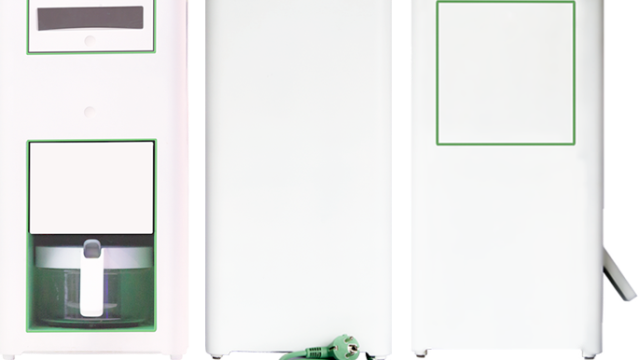Here is a good idea: A coffee machine that roasts, grinds and brews all in one go — raw, green beans to a hot cup of coffee on your countertop. Hell yeah. Freshness.
Here is a bad idea: Crowdfunding hundreds of thousands of dollars by lying about how far along you are in developing said project, suddenly making it a proprietary system before backtracking, and then continuing to act like a sketchball when the people who gave you money call you out on it.
The story of one still-pending, oft-delayed, and infuriating coffee machine dream is a cautionary tale for pretty much everyone involved. And yet another clear sign that crowdfunding has a serious credibility problem.
Coffee startup
Bonaverde led three crowdfunding campaigns for its vision of an all-in-one roast-to-cup machine (because why take money from one group of idealists if you can take it from three?), raising $US681,461 on Kickstarter, $US124,529 on Indiegogo, and nearly $US1.5 million on European crowdfunding site Seedmatch.
Now hundreds of Kickstarter backers are furious at the company, claiming the campaign was at worst a scam and at best a pretty shady bait-and-switch. People are already looking into class-action lawsuits and other legal recourse to get their money back. The kicker? Bonaverde is refusing to give full refunds until the company becomes profitable. Backers have now hatched a sort of crowdsourcing forum of their own to explore their options.
So how’d things get so bad?
The coffee racket
The trouble started after Bonaverde’s Kickstarter campaign wrapped on December 8, 2013. The anticipated delivery was October 2014, but it soon became clear that the original plans needed significant retooling. Backers criticised the project for misleading them about how far along the prototype was when the campaign launched. But that was just a prelude to a much larger problem.
The original Kickstarter promised a machine that would let people customise the way they roasted raw beans. The Bonaverde team never outright stated that the machine would be compatible with any coffee bean, but there was no mention of a plan to limit the kind of beans that would work with the machine. They even demoed a prototype of a machine where you pour in the raw beans of your choosing, press a button, and roast.
But then in July, the company updated its backers with a development that hey, actually, in order to use the machine people would have to buy Bonaverde beans through a marketplace it developed with farmers. The coffee maker would use RFID tags to process pre-prepared servings of coffee. Proprietary beans! Basically, you were locked in for the life of the machine. Many backers who had pledged $US300 expecting a machine they could use with any bean were apoplectic.
Bonaverde framed this surprise feature as a way to help people not fuck up their coffee: “In the past, we’ve often experienced people misusing the machine in the most adventurous ways, filling beans into the water tank and vice-versa filling water into the roasting chamber etc. So one of our main goals is to make the machine as easy to use as possible,” it wrote. But many of the backers believe it deliberately deceived them and had plans to introduce this feature from the beginning.
There was some reason to suspect subterfuge. Bonaverde’s founder, Hans Stier, had previously been involved with another startup called Kaffee Toro, a subscription-based raw bean home delivery service. It promised that subscribers would receive a free all-in-one roaster-grinder-brewer machine so that they would have a way to make coffee from the beans, as a kind of bonus for joining the subscription service.
Kaffee Toro went kaput, and at first it seemed like Stier had isolated the machine idea to start Bonaverde. The introduction of the RFID tags, though, led some backers to surmise that Stier had actually been plotting a way to reintroduce his original concept all along. Instead of just lifting the machine into its own product, they claim, Stier has reverse-engineered his first startup’s business model, shifting the selling point to the machine but sneaking in the marketplace as an afterthought. Unlike the original plan for a machine, the machine-plus-beans model is a far more profitable setup for Bonaverde, since it changes a one-time hardware purchase into a commitment to buy coffee through the startup.
Stier denies that the RFID design change was pre-planned. “It’s very important for me to state again that we did not plan on implementing the RFID either before or during the Kickstarter campaign. This only came up afterwards,” he told me.
Bonaverde eventually conceded to angry backers by announcing it would provide special reusable RFID tags to backers so they could use beans of their choosing. But many remain rankled; they no longer believe that the project has been carried out in good faith and still want refunds. And can’t get them.
Things heated up even more when Bonaverde pushed back its deadline yet again this month, now with a soft launch date in summer 2015 — another delay for a machine many backers don’t even want anymore.
When I talked to Stier, he admitted that Bonaverde had “fucked up” the timeline and the design of the project, but was adamant that the essential vision is intact and that Bonaverde would begin mass-producing its machines whether or not its backers wanted to shove the machines up his coffee-coloured holes. He may very well believe what he’s saying when he says the RFID idea came along at the time Bonaverde says it did.
Raging backers
But that’s a hard tale to swallow for many of the project’s backers:
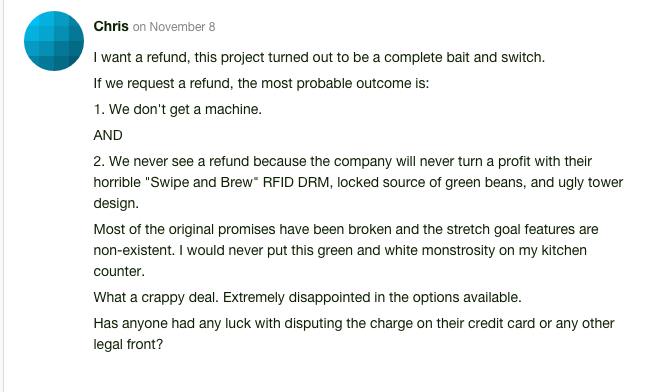
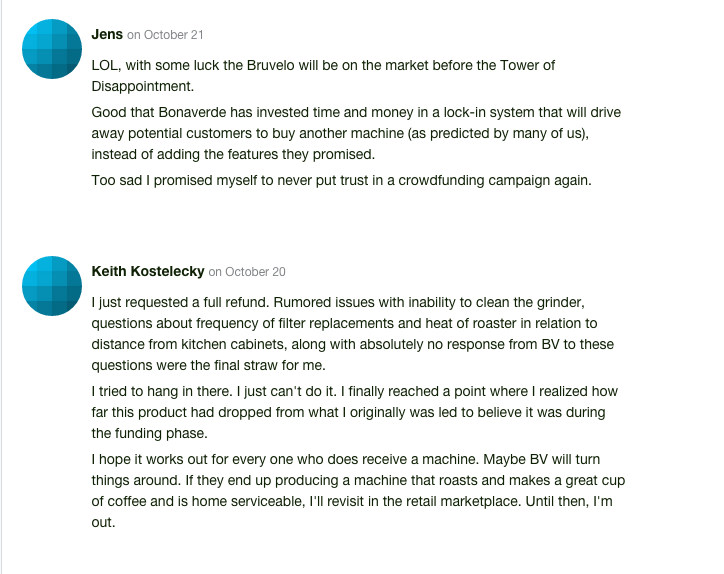
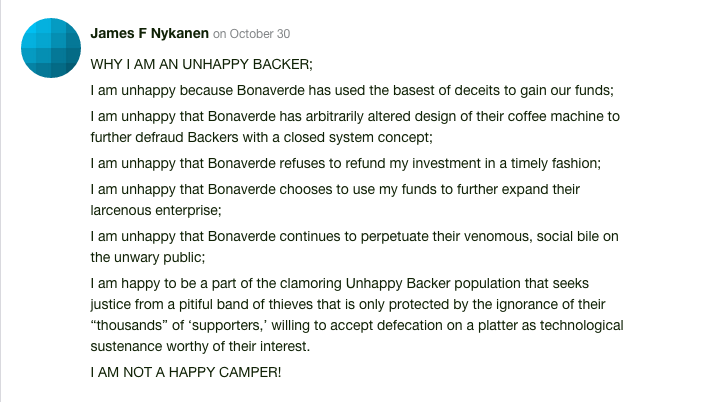
People are upset on Indiegogo too:
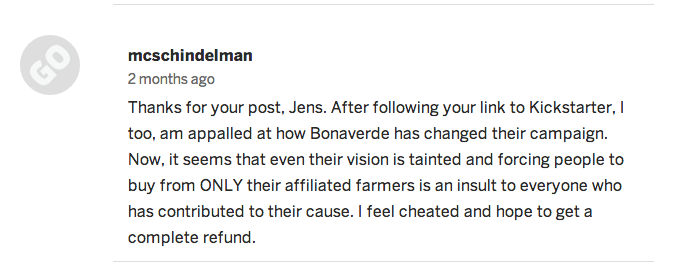
“There’s no way we could pay out the people that had backed before, and I don’t think it would be reasonable to endanger a project that is running very smoothly, very well, that is almost on time compared to the hundreds of thousands of Kickstarter projects,” Stier told me when I asked about the refunds.
Disgruntled backers have started a forum to facilitate their coordinated legal action. “We’re crowdsourcing different ideas on how to use the consumer protection laws in our various jurisdictions to make sure we’re protected and that we get our refunds. The problem is that Bonaverde is based out of Germany,” law student and unhappy backer Tony Godfrey told me.
This is a fight that backers plan to take to court. And what this fight comes down to is a fundamental disagreement over two things: What Bonaverde owes the backers, and whether the decision to use a locked system violates the vision of the original crowdfunding mission.
As far as the second disagreement goes, the decision to implement RFID sure as hell looks like something that completely changed the nature of the project. If they can prove their allegations that Bonaverde misled them on purpose, they will have a better chance in legal channels… though they’re still facing a big problem.
As Stier pointed out, Kickstarter backers are not paying for a product, they are supporting a vision. No matter how righteous backers are in feeling duped, according to Kickstarter’s rules, Bonaverde does not owe them the coffee machine they originally pledged money towards as long as Bonaverde has an explanation.
So where is Kickstarter in all this? Conveniently staying out of it, as per its accountability policy.
“It’s our policy to not comment on individual projects,” a Kickstarter spokesperson told me when I asked about the case. Kickstarter’s statements about what project creators owe their backers make it pretty clear the crowdfunding site won’t get involved:
When a project is successfully funded, the creator is responsible for completing the project and fulfilling each reward. Their fundamental obligation to backers is to finish all the work that was promised. Once a creator has done so, they have fulfilled their obligation to their backers.
At the same time, backers must understand that Kickstarter is not a store. When you back a project, you’re helping to create something new — not ordering something that already exists. There’s a chance something could happen that prevents the creator from being able to finish the project as promised.
While the backers would have a case if they could prove that Bonaverde strategically withheld plans to bilk money from them, they do not have proof, and they have limited options to force Bonaverde to give them their money back.
Backing a vision vs. buying a product
Now, Kickstarter isn’t a place to buy things. It’s not an investment opportunity. It’s a place to gamble on helping creators bring their visions for future projects into reality, and sometimes those visions can shift dramatically. That is something everyone should know going into crowdfunding.
But the complete lack of recourse for backers could end up being Kickstarter’s undoing if projects like this continue to damage its credibility. The company’s policy means it’s still able to keep its cut of the donations even if a project screws over its backers. That’s good for Kickstarter. And shitty for users.
It’s not right, and probably not sustainable. Which is why many think Kickstarter should offer an insurance policy to protect users from situations like Bonaverde. Indiegogo is currently testing an insurance plan for backers when projects fizzling out without fulfilling promises. This is a good thing.
It is, however, illegal to intentionally scam people out of their money — even in the world of crowdfunding. So if the backers can prove that Bonaverde did in fact deliberately deceive them about the project from the get-go, they may be able to convince Kickstarter to intervene, and they may be able to make their case in court. There has already been one instance where the Washington state government filed a court case on behalf of people scammed by a Kickstarter campaign, so it’s not entirely unprecedented.
For now, this situation is a reminder that you’re basically giving your money away when you pledge to Kickstarter campaigns. It’s a reminder that you have no guarantee and very limited recourse if you do get taken in by an unrealistic Kickstarter or a project that fizzles out, and that the crowdfunding community must push for additional safeguards if it want to maintain its most credible and popular service’s credibility. Kickstarter originally had a stricter vetting process for the projects it hosts, but this June the company relaxed its regulations, putting its process more in line with Indiegogo, which doesn’t ban projects unless they’re illegal, regulated, or dangerous.
Unlike the disastrous Kreyos Meteor or countless other long-delayed or just straight-up failed crowdfunding projects, Bonaverde is making inroads with its ambitious project. The company does plan on releasing a machine that roasts, grinds, and brews coffee. It is indisputably behind schedule, but in Kickstarter World, it’s not a shocking post-funding delay. (There’s an espresso maker funded back in January 2012 with over $US300,000 and so far, no product.) At least Bonaverde is making progress and updating its backers… but the fact that the project’s general sketchiness looks relatively benign compared to completely failed projects and outright scams is evidence of crowdfunding’s weakness.
The more projects continue to erode public trust, the more the crowdfunding site’s reputation will suffer. Kickstarter should take a keen interest in cases like this or it risks endangering the foundation of its appeal.
